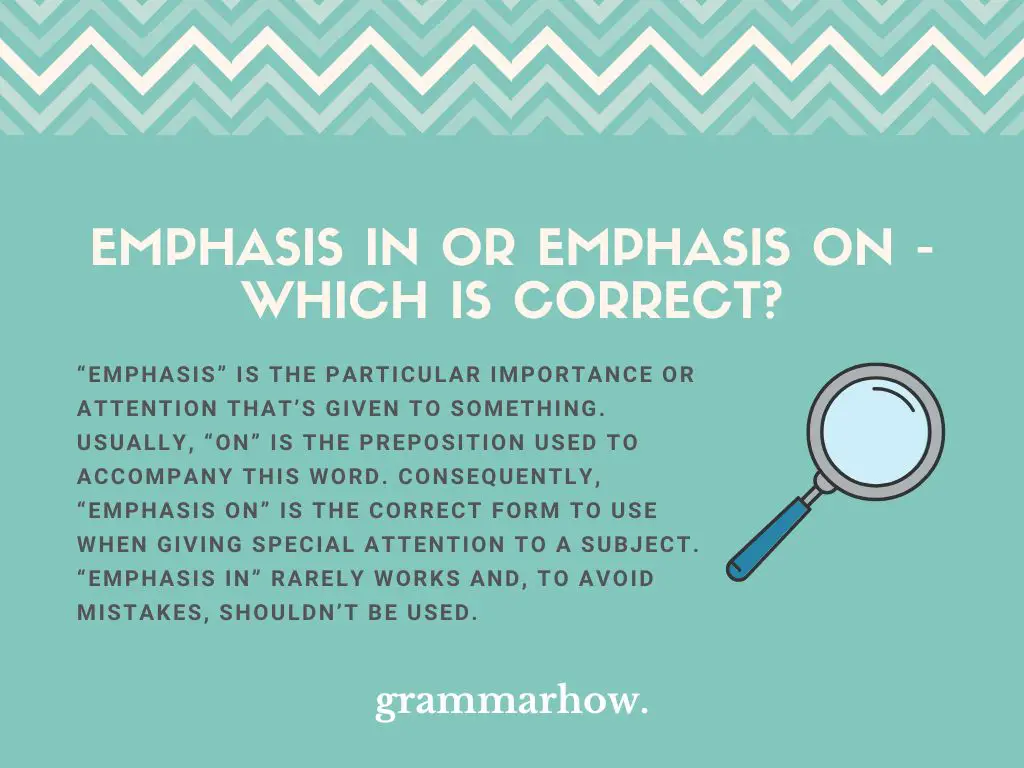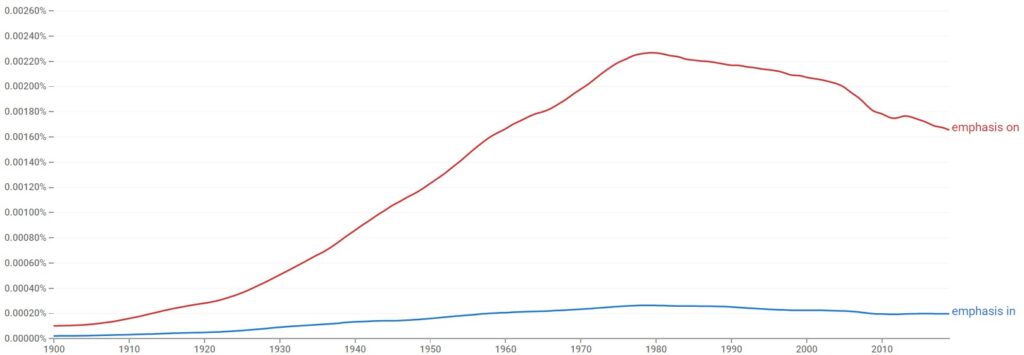Which prepositions to use with a word is often a tricky choice. Sometimes, we don’t even give it a thought: we’ve heard those words so much, that it just flows naturally.
But think, for example, about “Emphasis In” and “Emphasis On”. Which form is correct? And which should we avoid?
Emphasis In or Emphasis On – Which Is Correct?
“Emphasis” is the particular importance or attention that’s given to something. Usually, “On” is the preposition used to accompany this word. Consequently, “Emphasis On” is the correct form to use when giving special attention to a subject. “Emphasis In” rarely works and, to avoid mistakes, shouldn’t be used.

Take a look at the examples below:
- Make sure to put emphasis on the date and time, when preparing the invitation.
- Make sure to put emphasis in the date and time, when preparing the invitation. (incorrect)
In the examples, someone is offering advice on how an invitation should be presented: with “Emphasis On” the date and time for the event. In any general scenario, in which someone asks for “Emphasis” to be placed on certain information, “Emphasis On” will work well.
“Emphasis In”, on the other hand, is incorrect and should be avoided. The reason is that the preposition “In” usually indicates that something is within certain limits, confined in one way or another. That doesn’t usually make sense with the word “Emphasis”.
Let’s take a look at each form separately.
Emphasis In
The preposition “In” indicates something is inside, or that content is within certain limits. Usually, this isn’t the context in which we use the word “Emphasis”. Consequently, “Emphasis In” doesn’t work well and should be avoided.
Take a look at the examples that show “Emphasis In” being used incorrectly, followed by a corrected version of the same sentence:
- The department offers a degree with an emphasis in genetic research. (incorrect)
- The department offers a degree with an emphasis on genetic research.
- The emphasis of the study was in the social aspect of adoption. (incorrect)
- The emphasis of the study was on the social aspect of adoption.
- When John writes, his emphasis is in the past. (incorrect)
- When John writes, his emphasis is on the past.
As the examples show, “Emphasis In” is incorrect and should be avoided. “Emphasis On” works better and makes more sense.
Emphasis On
“Emphasis On” is the most common form to indicate what’s important and deserves special attention. The preposition “On” is frequently used to indicate the position of something, that’s above something else (literally or figuratively).
It makes sense that “On” is used with the word “Emphasis”, which is meant to give importance to things. “Emphasis On” indicates what’s the important things that we should pay attention to.
Take a look at the examples below:
- Carl’s scientific degree has an emphasis on biology.
- There should be more emphasis on the third heading in your text.
- The company’s emphasis should be on selling a higher volume of products.
- Don’t you think we should place emphasis on prevention, as much as we do on the cure?
- When you speak, put emphasis on the final syllable.
Frequently, the phrase “Emphasis On” can be replaced by the word “Emphasize”. You should keep it in mind, or instances when you need to be concise or more objective in your content.
Which Is Used the Most?
Which one of those forms is used more often, “Emphasis On” or “Emphasis In”? Take a look at the graph from Google Ngram Viewer below.

As expected, “Emphasis On” is used with much more frequency than “Emphasis In”. It makes sense, considering this is the general way of indicating how emphasis should be placed on things.
Although there are expectations in which “Emphasis In” would rarely be considered correct, it’s clear that “Emphasis On” sounds more organic and idiomatic. You should always prioritize this form in your communications.
Final Thoughts
“Emphasis On” is the correct form, generally used and accepted to talk about the things that should be given more importance in a certain context. You should always use “Emphasis On”. “Emphasis In” is usually incorrect, and should be avoided to prevent grammatical mistakes.

Martin holds a Master’s degree in Finance and International Business. He has six years of experience in professional communication with clients, executives, and colleagues. Furthermore, he has teaching experience from Aarhus University. Martin has been featured as an expert in communication and teaching on Forbes and Shopify. Read more about Martin here.
